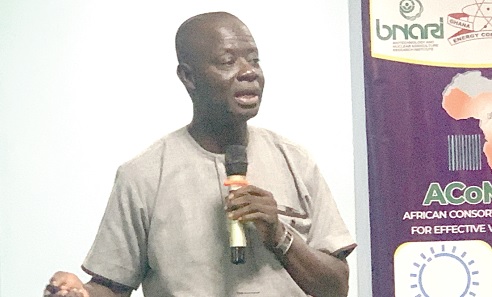
Invest in biotechnology research - GAEC to government
The Biotechnology and Nuclear Agricultural Research Institute (BNARI) of the Ghana Atomic Energy Commission (GAEC) has called on the government to invest in biotechnology research institutions.
It explained that the institute had the human resource capacity to harness technologies to increase food production and reduce post-harvest losses.
Currently, the institute said it was leveraging technologies such as the black soldier fly which could convert organic waste into protein.
The protein, it said, could replace about 50 per cent of protein needed in animal feed in the country, therefore, its usefulness for poultry and livestock systems.
The institute is also screening for sweet potato virus disease and cultivar resistance breeding using conventional and molecular approaches.
BNARI
A Former Director of BNARI, Professor Kenneth Danso, who made this known during a public lecture said BNARI was one of the top research institutions promoting biotechnology solutions to agriculture and related fields in the country.
He said the BNARI had over the years used technology to help in the country’s agriculture development such as producing planting materials free from diseases.
The public lecture held in Accra, last Thursday was part of activities to mark the 30th anniversary of the institute.
The lecture was on the theme: Blazing the Biotechnology Trail in Ghana: The BNARI Story.
Biotechnology
Delivering a lecture on the theme, Prof. Danso, who is also the Associate Professor of the School of Nuclear and Allied Sciences (SNAS), highlighted the chronicles of the institute as well as their works in the area of biotechnology.
He said they had supplied MD2 pineapple materials, an exotic kind, to the Ministry of Food and Agriculture for onward dissemination to farmers in need of the MD2 pineapple planting materials.
This was when the international market had shifted from smooth canyene varieties to MD2 pineapples in 2003.
“The introduction of the MD2 pineapples planting materials into Ghana came to BNARI and the institute multiplied it for MoFA.
“We also multiplied planting materials for farmers in the Ashanti Region through MoFA, supplying over 19,000 planting materials for plantain.
“Private individual farmers in other regions also came for planting materials for plantain, banana, and they were happy since they got a better yield than the conventional ones,” he said.
He said the institute had the capacity to make a greater impact on the country’s agriculture systems.
“We have the lab and scientists, they are paid every month but money to do the research work itself is not given, sometimes what comes into research is very minimal.
“We need money to initiate new projects to address challenges that are facing farmers,” he stated.
Prof. Danso said tissue culture had no adverse effect but rather cleaned planting materials from diseases and pathogens provided it was planted in a very good soil.
Food production
The Director of the institute, Michael Osae, said COVID-19 pandemic had exposed the country's fragile food system and said it was crucial to find ways to increase food production.
He expressed the hope that the impact of biotechnology on food production would be positive in the next decade.
The Head of Department of Nuclear Agriculture and Radiation Processing, SNAS, Dr Samuel Amiteye, said the country must apply scientific methods related to biotechnology to transform agriculture and to rapidly develop as a country.
